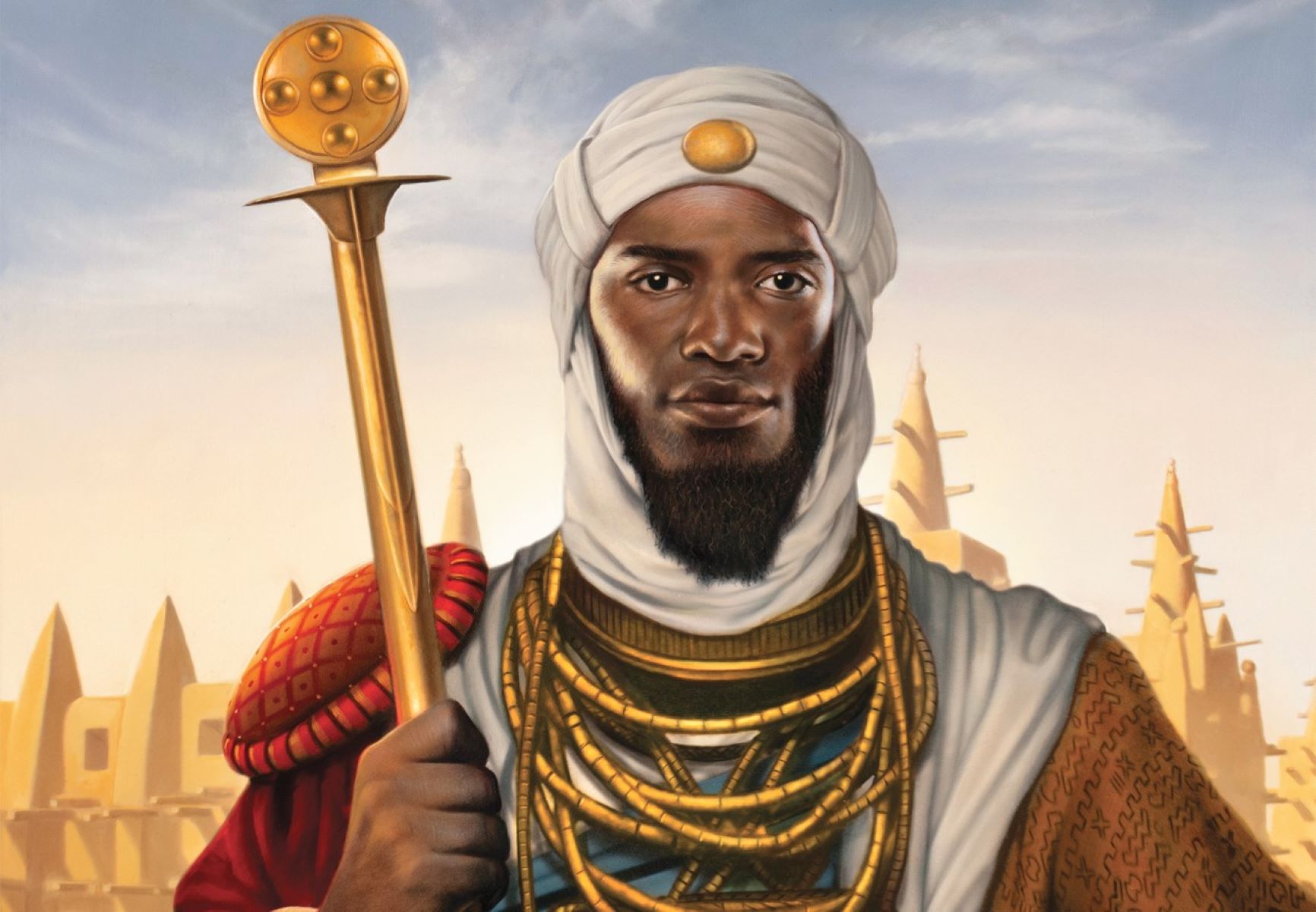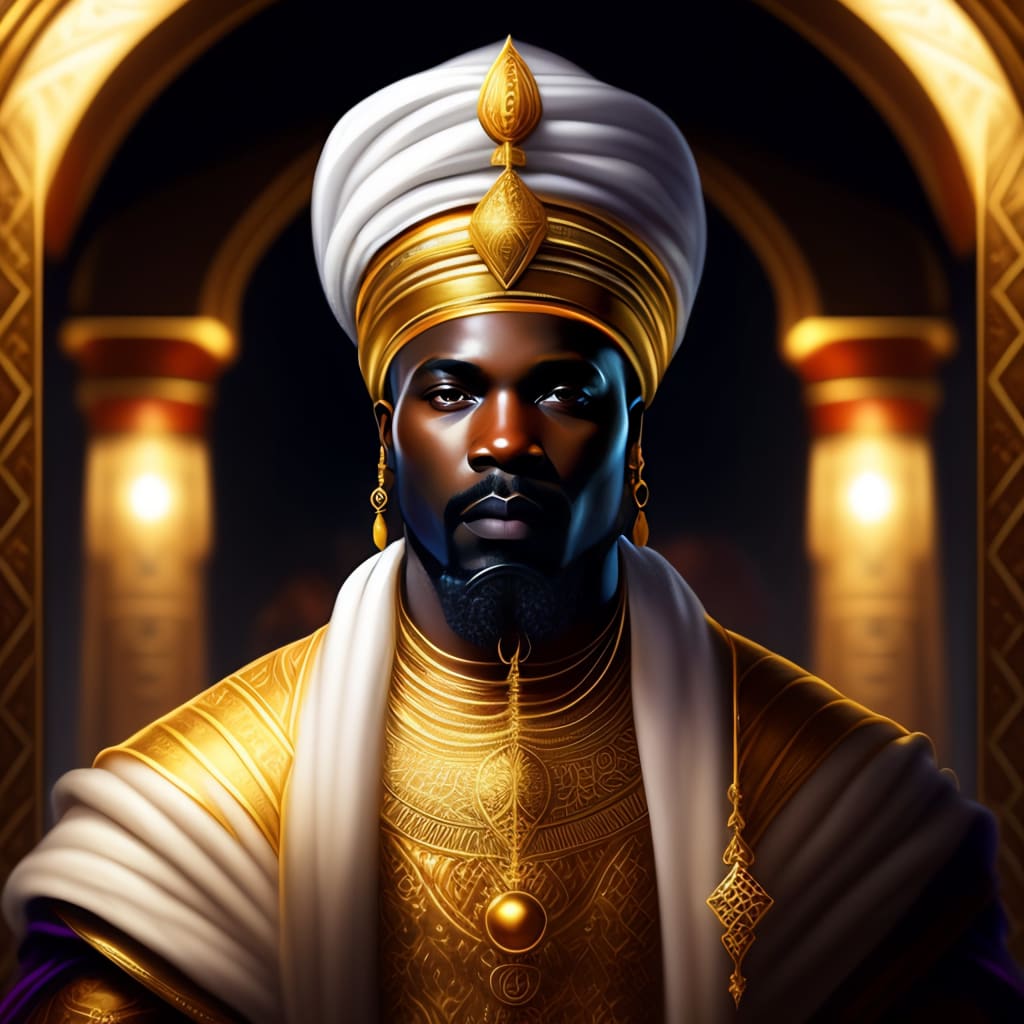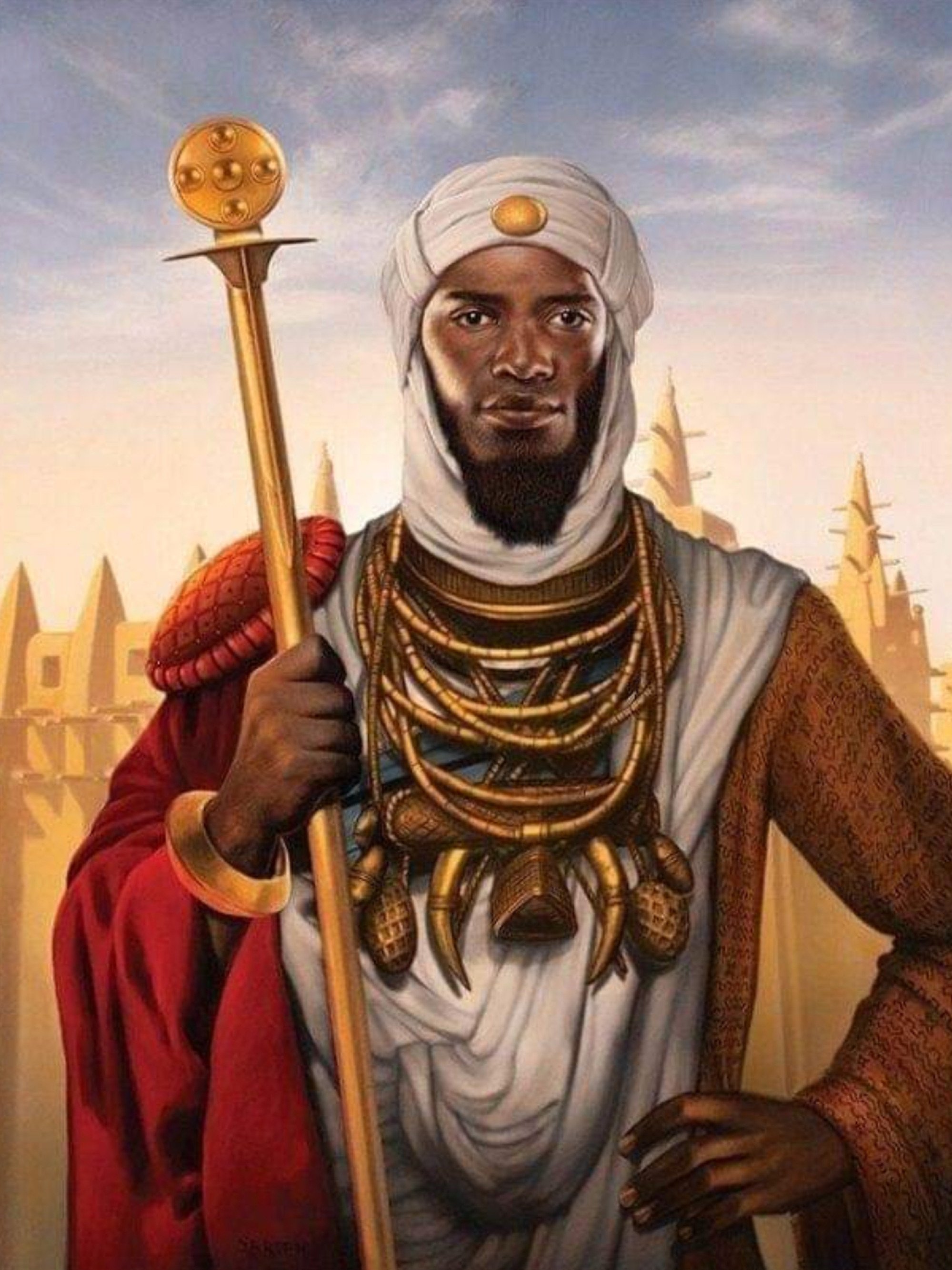Mansa Musa - Africa's Golden Ruler Of The 14th Century
Imagine a person whose riches were so vast, they became a story told for centuries, a kind of legend that echoes even today. We are talking about Mansa Musa, a truly significant historical figure from the 14th century. He was, as a matter of fact, a ruler of the Mali Empire, a powerful kingdom in West Africa, and his name is still spoken when people discuss immense wealth and influence. His story, you know, is one that really captures the imagination, showing us a time when power and resources were concentrated in ways that are pretty hard to picture in our modern world.
This individual, Mansa Musa, made a very famous trip, a pilgrimage to a holy city, and during this particular journey, he brought with him a huge number of people. He also spent money in a way that left a truly lasting impression on the places he visited. It's almost as if his presence alone could change the economic situation of an entire region, just because of the sheer amount of gold he carried and gave away. This was, in some respects, an event that put him and his empire on the map for many across the globe.
His story, actually, is more than just about how much money he had. It's about a period of history that saw a powerful African kingdom flourish, a place that was, quite literally, at the heart of the world's gold production. His life, and the way he managed his vast holdings, offers us a peek into a past where Africa played a very central role on the global stage, influencing trade, culture, and even the spread of ideas across continents.
Table of Contents
- The Life and Times of Mansa Musa
- A Golden Legacy - Mansa Musa's Incredible Wealth
- The Grand Journey - Mansa Musa's Pilgrimage to Mecca
- Building an Empire - Mansa Musa's Influence and Rule
- Mansa Musa's Impact on Culture and Faith
- The Legacy of Mansa Musa - A Lasting Impression
The Life and Times of Mansa Musa
Who Was Mansa Musa?
Mansa Musa, whose full name was "Mansa" Musa Keita I, was, to be honest, a very important person in the 14th century. He was the ninth, or sometimes even called the tenth, ruler of the Mali Empire. His time as a leader, which began in 1312, was marked by some truly remarkable accomplishments. He was known for having a lot of money, a good deal of power, and quite a bit of influence, especially within the Muslim world of his time. He was, you know, someone who really made a mark on history, being one of the first African leaders to become widely known across both Europe and the Middle East. It's pretty interesting, actually, how he came to rule; it seems it was a bit of an unexpected turn of events, as the previous emperor, Abubakari II, had asked Mansa Musa to take over his duties for a while.
Personal Details - Mansa Musa
| Full Name | Mansa Musa Keita I |
| Time of Reign | 14th Century (Started as Emperor in 1312) |
| Empire Ruled | Mali Empire, located in West Africa |
| Key Recognitions | Extraordinary Wealth, Significant Power, Broad Influence, Famous Pilgrimage to Mecca, Encouraged Islam, Developed Cultural Centers |
| Estimated Riches (Modern Equivalent) | Roughly US $900 billion |
| Major Accomplishments | Expanded and managed a vast territory, supported the growth of Islam, constructed places of worship and schools, helped Timbuktu grow as a center of learning. |
| How He Came to Power | Temporarily appointed by the previous emperor, Abubakari II. |
| Historical Fame | The very first African ruler to gain widespread recognition throughout Europe and the Middle East. |
A Golden Legacy - Mansa Musa's Incredible Wealth
When people talk about Mansa Musa, the first thing that often comes to mind is his incredible wealth. For a very long time, historians and people who study money have thought of him as the person with the most money who ever lived. This idea, you know, has been around for centuries. It's almost impossible to picture the sheer amount of resources he had at his disposal, a kind of abundance that is very hard to even picture in our heads today. To give you some idea, his wealth has been estimated to be around 900 billion US dollars in today's money. That's, like, a really staggering sum, something that makes even the richest people we know now seem a little less well-off by comparison.
How Did Mansa Musa Become So Rich?
So, you might be wondering, where did all this money come from? Well, the Mali Empire, which Mansa Musa led, was basically at the very heart of where the world's gold was produced during that time. This meant that a tremendous amount of gold was coming out of the ground in his territory, giving him what one might call an indescribable amount of riches. He had, essentially, control over the primary source of one of the most valuable things on earth. This control, you know, gave him an economic advantage that was pretty much unmatched anywhere else. He didn't just hoard this wealth, either; he actually used a good portion of his fortune to build important things, like schools, which shows a different side to his character.
The fact that his kingdom was the main supplier of gold in that period of history is, in a way, the simple answer to how he became so incredibly well-off. It allowed him to gather so many resources that he was able to spend in ways that truly astonished everyone who saw it. His control over this precious metal meant that his empire was, apparently, one of the richest and most prosperous places on Earth in the 14th century, covering an area of more than half a million square miles. That's a huge piece of land, and it was all producing this incredibly valuable stuff.
The Grand Journey - Mansa Musa's Pilgrimage to Mecca
One of the stories that really made Mansa Musa famous was his pilgrimage to Mecca. This was a religious trip, a very important one for Muslims, and he undertook it in 1324. This was, you know, a very big deal, especially back then, as it was quite a difficult proposition to travel such a long distance. He didn't go alone, either. He had a truly huge group of people with him, a kind of massive traveling party that made a lasting impression on everyone they met along the way. This journey, in fact, was a key reason why he became so well-known outside of Africa, particularly in the Middle East and Europe.
What Was Mansa Musa's Hajj Really Like?
Picture this: Mansa Musa traveled to Mecca with a caravan that included 60,000 men and 12,000 slaves. That's, like, an absolutely enormous number of people to move across vast distances. As they went, he spent money, especially gold, in a very lavish way. We hear stories about him spending so much gold in Cairo, for example, that it actually had a big effect on the local economy there for quite some time. This kind of spending, you know, wasn't just about showing off; it was also a way of making connections and showing the immense power and wealth of his empire to rulers and people in other lands. His journey was, in a way, a moving display of his kingdom's might and resources.
The sheer scale of this trip, with so many people and so much gold, was, apparently, something truly unforgettable for those who witnessed it. It was a journey that took a lot of planning and resources, given the conditions of travel in those days. The fact that he completed it, and did so with such grandeur, really cemented his reputation. It also allowed him to meet leaders from different places, which, as a matter of fact, probably helped him expand his influence and build relationships that benefited his empire. This pilgrimage was, in essence, a diplomatic mission as much as a religious one, showcasing the Mali Empire's prosperity and its place in the wider world.
Building an Empire - Mansa Musa's Influence and Rule
Mansa Musa wasn't just a man with a lot of money; he was also a very effective leader who worked to make his empire stronger and bigger. He was responsible for extending the reach of his vast kingdom and putting in place ways to govern it effectively. His rule, you know, saw the Mali Empire grow to an impressive size, stretching for two thousand miles from the Atlantic Ocean all the way to Lake Chad. This territory included, more or less, all or parts of many different areas, making it a truly significant power on the continent. He really understood how to manage such a large and diverse collection of lands.
How Did Mansa Musa Shape His Vast Kingdom?
One of the truly important things Mansa Musa did was to develop Timbuktu into a major center for culture and learning. He saw the potential in this city and helped it grow into a place where ideas and knowledge could truly flourish. This wasn't just about expanding land; it was about expanding the mind, too. He also, quite obviously, played a big part in spreading Islam and its associated culture throughout West Africa. His efforts helped to create a unified sense of identity and purpose across his vast domains. He was, in some respects, a builder not just of buildings, but of a shared way of life for his people.
His leadership was, apparently, quite remarkable in how he managed to keep such a large and diverse empire together. He didn't just conquer; he governed with a vision that aimed to make his kingdom a place of prosperity and enlightenment. This meant, you know, setting up systems that allowed for the smooth running of things, even across such huge distances. His focus on developing places like Timbuktu shows a ruler who looked beyond immediate gains, aiming for something that would last and benefit future generations. He was, really, a leader who thought about the long game.
Mansa Musa's Impact on Culture and Faith
Beyond his wealth and travels, Mansa Musa had a truly significant impact on the cultural and religious life of his empire. He was, to be honest, a very devoted Muslim himself, and he actively encouraged the spread of Islam among the people he ruled. This wasn't just a passive acceptance; he took direct steps to make sure the religion could take root and grow. This particular aspect of his rule is, like, a really important part of his overall legacy, showing his commitment to his faith and its role in society.
How Did Mansa Musa Spread Islam and Learning?
One of the main ways Mansa Musa promoted Islam was by building mosques, which are places of worship, and madrasas, which are Islamic schools. He built these important structures in major cities within his empire, such as Timbuktu and Gao. These buildings weren't just structures; they were, in a way, centers for religious practice and learning, helping to educate people and deepen their connection to the faith. By investing in these kinds of institutions, he was, essentially, creating a foundation for religious and intellectual growth that would last for a very long time. This shows a ruler who understood the importance of both spiritual and academic development for his people.
His efforts, you know, truly contributed to the flourishing of Islamic culture and scholarship in West Africa. He brought scholars and architects back from his pilgrimage, who then helped to build and teach within his empire. This exchange of ideas and knowledge was, apparently, a really big deal, helping to make his cities hubs of learning that attracted people from far and wide. The impact of Mansa Musa's dedication to faith and education was, in some respects, felt for generations, shaping the cultural landscape of the region in a way that is still visible today. He was, quite literally, building the future of his empire through these actions.
The Legacy of Mansa Musa - A Lasting Impression
Mansa Musa's reign was, basically, marked by an impressive array of accomplishments that touched upon wealth, religion, culture, education, and how things were governed. He is, very truly, recognized as a significant historical figure who left a lasting mark on the world. His story, you know, continues to be a source of fascination, reminding us of the power and influence that existed in African kingdoms during the medieval period. He wasn't just a rich person; he was a leader who used his resources to build, to spread knowledge, and to connect his empire with the wider world.
His depiction in historical maps, like the Catalan Atlas, is a good example of how widely known he became. He was, in fact, the first African ruler to achieve such widespread fame throughout Europe and the Middle East. This recognition, you know, speaks volumes about the impact of his pilgrimage and the sheer scale of his empire's wealth and influence. The stories of his gold, his caravan, and his generosity are, apparently, still told, making him a truly legendary figure. He remains, in some respects, a powerful symbol of African prosperity and leadership from a bygone era.

13 Unbelievable Facts About Mansa Musa - Facts.net

Unbelievable Mansa Musa History as the Wealthiest African Man

Who was Mansa Musa, the ‘richest man in history’ – and what would his